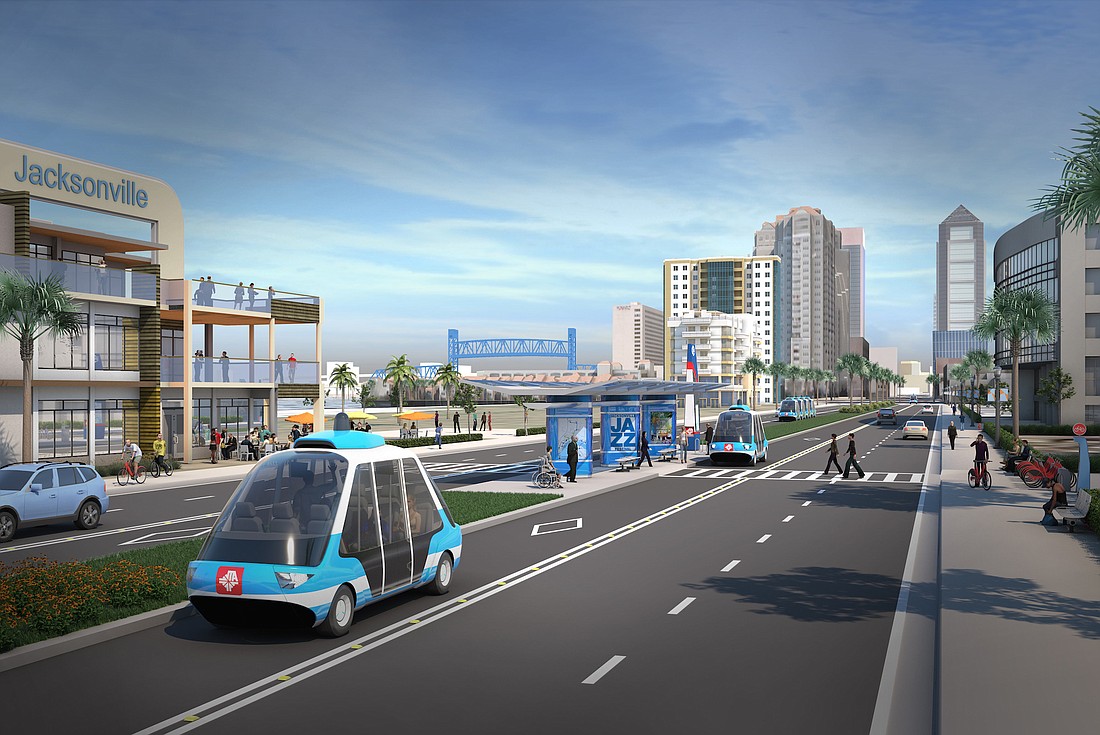
The Jacksonville Transportation Authority is looking to the private sector to build and run its Ultimate Urban Circulator autonomous vehicle program — the U2C.
The public transportation system, which features driverless, low-speed electric vehicles, could eventually replace the Skyway.
JTA CEO Nathaniel Ford said Feb. 24 the authority plans to issue a request for proposals for the project JTA officials estimate will cost $350 million to $400 million.
Ford said JTA would likely offer a 30-year contract for operating and maintaining the U2C, and the authority hopes to have bid proposals to the board by February 2021.
The winning bidder would be repaid over a 30-year period.
JTA hosted an industry forum Feb. 19 to get private sector feedback on the U2C and to begin networking for the proposed public-private partnership.
U.S. and international industry experts participated in panel discussions and forums on policy, procurement, infrastructure, autonomous vehicle technology and transit-oriented development.
According to JTA Communications Director David Cawton, sessions focused on engineering, the Internet of Things, Skyway infrastructure and procurement.
“The response and international attention this forum received is a testament to the attention to detail and momentum the JTA is building for the U2C,” Ford said in a written statement. “This program will not only complement the JTA’s vast transit network, but also sends a message to the entire world that Jacksonville is the place to be for innovation.”
In his Feb. 24 interview, Ford said bringing together a consortium of private sector businesses could be the best strategy to secure a lender for the U2C build-out and operation.
“That would be a very immense lift for us as the JTA,” Ford said. “Our challenge is going to be identifying that funding stream.”
Ford said a public-private partnership will allow the U2C to be built sooner.
“The public-private partnership gives us the ability to share some of that risk in terms of the development of the technology, share some of the risk in terms of the future and what may happen in terms of the development of the project and technological changes,” Ford said.
The concept for the U2C was idle for years before Ford took over as CEO in 2012.
Phase I, expected to be completed by 2025, is fully funded. JTA will spend $44 million to build a 3-mile, ground-level loop for the automated vehicles along Bay Street from the Skyway’s Downtown Central Station at Julia Street to TIAA Bank Field — part of the proposed Bay Street Innovation Corridor.
The U.S. Department of Transportation awarded the JTA and the city grants totaling $25 million for the project.
Phase II will convert the existing Skyway track into an elevated roadway for autonomous vehicles.
Cawton said the 0.9-mile autonomous track under development will be a “proof on concept” for the U2C.
It will connect the Jacksonville Regional Transportation Center in LaVilla and the Skyway’s Jefferson Station to test and troubleshoot converting the elevated tracks for the U2C.
Phase III will complete the 10-mile autonomous vehicle network into neighborhoods surrounding Downtown — north to Springfield and UF Health Jacksonville and south to Brooklyn/Riverside and San Marco.
One funding source JTA sees to finance the U2C is its surplus real estate.
JTA is marketing surplus properties to developers for mixed-use projects that will connect to public transportation and facilitate a walkable community.
The JTA board approved an option agreement Jan. 28 with Corner Lot Development Group and Chance Properties LLC for a proposed residential and retail development on the Downtown Southbank.
The agreement would include a long-term lease for 3.8 undeveloped acres along Montana Avenue near the Kings Avenue Transit Station.
JTA has five other properties it is offering, and Ford said the authority is looking at additional real estate holdings that could be used to repay loans associated with the U2C, either through long-term leases or property sales.